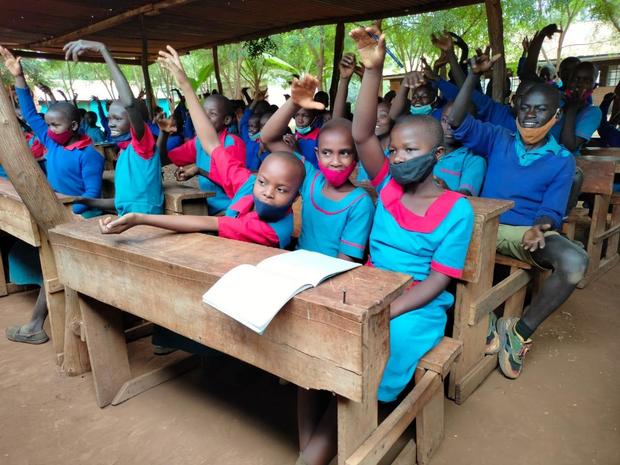11 million girls worldwide at risk of not returning to school after COVID-19, U.N. says
Rachel Muthoni, a 19-year-old from Irimba village in Tharaka-Nithi county, Kenya, has missed about seven months of school. At times, she didn't have enough money for fees or even food.
"COVID-19 put a temporary stop to my education, and that meant that I lost one year of schooling. I got stuck in one academic year for two years. Also, seeing that the pandemic was unexpected, it put a lot of pressure on my family in terms of taking care of me by providing food and necessities required for online learning during the pandemic," Muthoni, a Women's Global Education Program Kenya scholar, told CBS News.
Muthoni is one of 11 million girls worldwide who may not return to school after the pandemic, according to the United Nations. The weight of the pandemic's economic toll has fallen disproportionately on women's shoulders, as work-from-home shone a light on the reality that women still carry a majority of child care responsibilities. Now, a generation of girls can potentially be left behind from the socioeconomic benefits of education access.
A UNESCO report released last year found that increased dropout rates among girls not only deepens gender gaps but also increases risk for sexual exploitation and forced marriage.
The World Economic Forum estimates it will take over 130 years to close the gender gap, which has increased by about 35 years compared to last year.
"We can see not only the impact of this trend on this generation of girls, but also on future generations, because we know that an educated mother is the strongest predictor of success for children in terms of their ability to go to school and their health outcomes," Emiliana Vegas, codirector and senior fellow at the Center for Universal Education at Brookings, told CBS News.
Congress and leaders around the world are trying to figure out how they might reverse a generational loss in gender equality. They're starting in the classroom.
In the U.S., Representatives Lois Frankel and Michael Waltz last week reintroduced the Keeping Girls in School Act in an effort to focus on keeping girls in underdeveloped countries in school at the secondary level, according to the press release.
"This bill is about removing the obstacles that especially young girls face going for secondary education. That could be anything from safety to child marriage to genital mutilation," Frankel told CBS News.
If passed, the bill would authorize USAID to enter into new international development projects focused on combating barriers to girls' education, but it would not direct appropriation of funds.
"In addition to supporting this legislation, Congress should explore how to immediately deploy more funding to nonprofit organizations and government partnerships that are working to support the millions of girls out of school today, including how to mobilize the over $140B in donor-advised funds across the country," Amy Maglio, founder of the Women's Global Education Program, told CBS News.
Internationally, the G7 communique announced their collective goal of having 40 million more girls in school by 2026 in low and lower middle-income countries.
"We recognize that COVID-19 has been the largest disrupter to education in modern history, affecting all children, but especially girls and those already left behind," said the G7 communique.
The announcement comes after the United Kingdom, the current country in presidency at the G7, received backlash for reducing funding to U.N. Family Planning.
During the U.N. Women summit last month, UNESCO launched a five-year-plan that includes a focus on the digital gender divide.
One solution put forward by economists is the urgent need to re-open schools worldwide.
"The international community really needs to put their money where their mouth is," Vegas said.
"There's this huge risk of losing a generation of girls because of the school closures related to COVID and having them not return to school. We need to make an effort to not just reopen schools, but really actively recruit girls to come back," Vegas said.
Waltz argues that Americans should see girls' education as a national security issue.
"When you draw the thread that actually our daughters are safer here when girls are educated abroad, that the world will be a safer place, and that in the future our sons and daughters won't have to go as soldiers and development officers and diplomats to these fragile societies because of the investments we make in these generations, people get it and they support it, " Waltz told CBS News.
For now, a generation of girls are dealing with the pandemic's side effect of putting them at risk of never returning to an education.
"My education is everything for me. Through education, I see a way out, whereby I'll be able to give me and my family a better life while still giving back to society," Muthoni told CBS News.







